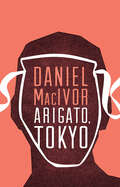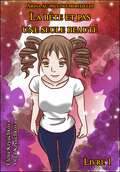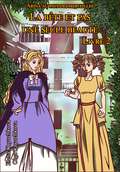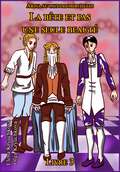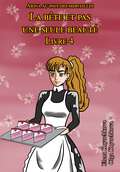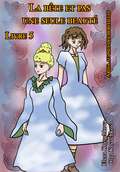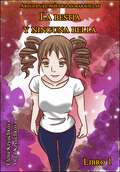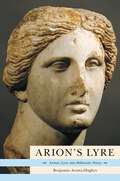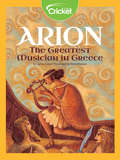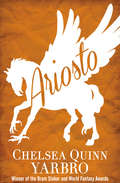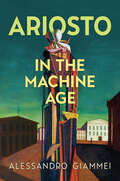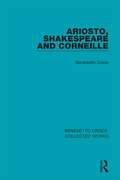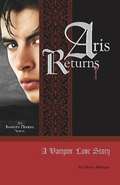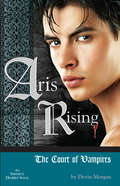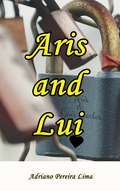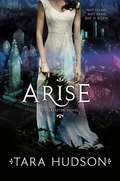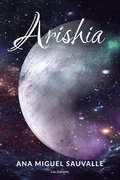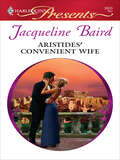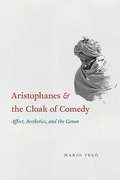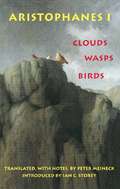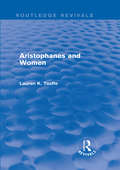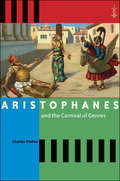- Table View
- List View
Arigato, Tokyo
by Daniel MacIvorOn a publicity tour in Japan, Carl, a Canadian author, finds himself falling in love amidst the sacred stages of Noh theatre and the seedy dance clubs in Tokyo, wired on cocaine and sake. His object of affection is the young, seductive actor, Yori, but the affair becomes complicated when Carl’s translator and Yori’s sister, Nushi, becomes entranced with him. As his tour continues, he straddles the fragmentary place between two cultures—one of individuality and directness, the other of tradition and formality—and uncovers the dualities that exist in life and love. Based on The Tale of Genji, one of the world’s oldest pieces of literature, MacIvor’s script takes us into the centre of a clandestine Japan as experienced by the visiting outsider.
Arilla Sun Down
by Virginia HamiltonAn American Library Association Notable Book and a School Library Journal Best Book of the Year:Twelve-year-old Arilla goes on a quest to discover who she is and where she fits into her family—and the world Arilla Adams is tired of being the moon to her older brother&’s sun. Sixteen-year-old Jack has rejected being part of an interracial family and identifies only with his Native American heritage. But Arilla, also part African American and part Native American, isn&’t so sure where she belongs. She knows there are people who care about her. Old James False Face tells her stories. Her mom, who&’s as beautiful as a queen, wants Arilla to learn to dance. And her classmate Angel Diovalad, the star of the girls&’ basketball team, tells her secrets about the boy she loves, whom she meets with on the sly. Arilla also has secrets: She sneaks out to the roller rink to practice figure skating. And she&’s afraid of horses. But she&’s about to discover her inner courage on a daring rescue mission that will transform her relationship with her family and earn her the name Arilla Sun Down.
Arima enkoniatuak
by Xabier Mendiguren ElizegiLau ipuin luze edo nobela laburrez osatua. Ikasleaz maitemindu den irakasle heldua, gaztetako abenturarik zoroenak elkarri kon-tatzen dizkioten bi emakume, politika eta larru kontuak nahasten dituen istorioa... Sentimen-duak nahiz gorputzak sortzen diguten ahalkea ahaztuz, muturreraino eraman ditu pertsonaiak eta egoerak, era askotako teknikak erabiliz: gutuna, elkarrizketa hutsa...
Arina au pays des merveilles. La bête et pas une seule beauté. Livre 1 (Arina au pays des merveilles. La bête et pas une seule beauté #1)
by Olga Kryuchkova Elena KryuchkovaArina se retrouve dans un monde magique et fait la connaissance de la fée Miranda, qui essaie de désensorceler son filleul, le prince Henri (dont le visage est défiguré par un mauvais sort). Et seul le baiser d’une princesse peut l’en libérer. Ensemble, Miranda et Arina fondent l’agence matrimoniale Mariages et roses, puis en font la publicité grâce à un miroir magique. Les princesses accourent à l’agence, mais aussi les fraudeuses. Les aventures magiques d’Arina dans un autre monde commencent !
Arina au pays des merveilles. La bête et pas une seule beauté. Livre 2 (Arina au pays des merveilles. La bête et pas une seule beauté #2)
by Olga Kryuchkova Elena KryuchkovaLa jeune fille et la fée marraine ouvrent une agence matrimoniale pour désensorceler le prince, mais les choses ne se passent pas comme prévu…
Arina au pays des merveilles. La bête et pas une seule beauté. Livre 3 (Arina au pays des merveilles. La bête et pas une seule beauté #3)
by Olga Kryuchkova Elena KryuchkovaLa licence de la fée marraine arrive à expiration ! Que va-t-elle devenir sans magie ? Comment pourra-t-elle arriver à payer sa nouvelle licence ?
Arina au pays des merveilles. La bête et pas une seule beauté. Livre 4 (Arina au pays des merveilles. La bête et pas une seule beauté #4)
by Olga Kryuchkova Elena KryuchkovaVoici maintenant que le roi débarque lui aussi à l’agence matrimoniale de la fée marraine. Le prince et lui vont devoir se confronter à la fée ensorceleuse…
Arina au pays des merveilles. La bête et pas une seule beauté. Livre 5 (Arina au pays des merveilles. La bête et pas une seule beauté #5)
by Olga Kryuchkova Elena KryuchkovaLe Prince trouve la Princesse et le mauvais sort est rompu. Mais ils ne peuvent se marier sans les documents officiels. Que vont faire la jeune fille et la fée ?
Arina en el país de las maravillas. La bestia y ninguna bella. Libro 1 (Arina en el país de las maravillas. #1)
by Olga Kryuchkova Elena KryuchkovaArina se adentra en un mundo mágico donde conoce al hada Miranda, quien trata de desencantar a su ahijado, el príncipe Henry, (su cara está desfigurada por un hechizo maligno). Y solo el beso de una princesa puede romper el hechizo. Miranda y Arina montan una agencia matrimonial "Bodas y Rosas" y se anuncian en un espejo mágico. ¿Se llenará la agencia de princesas? ¡Comienzan las aventuras mágicas de Arina en un mundo nuevo!
Arion's Lyre: Archaic Lyric into Hellenistic Poetry
by Benjamin Acosta-HughesArion's Lyre examines how Hellenistic poetic culture adapted, reinterpreted, and transformed Archaic Greek lyric through a complex process of textual, cultural, and creative reception. Looking at the ways in which the poetry of Sappho, Alcaeus, Ibycus, Anacreon, and Simonides was preserved, edited, and read by Hellenistic scholars and poets, the book shows that Archaic poets often look very different in the new social, cultural, and political setting of Hellenistic Alexandria. For example, the Alexandrian Sappho evolves from the singer of Archaic Lesbos but has distinct associations and contexts, from Ptolemaic politics and Macedonian queens to the new phenomenon of the poetry book and an Alexandrian scholarship intent on preservation and codification. A study of Hellenistic poetic culture and an interpretation of some of the Archaic poets it so lovingly preserved, Arion's Lyre is also an examination of how one poetic culture reads another--and how modern readings of ancient poetry are filtered and shaped by earlier readings.
Arion: The Greatest Musician in Greece
by James LloydArion is a famous musician in ancient Greek mythology. He loves to travel across Rome and Greece to play his music. While trying to sail home, he is robbed by a group of pirates! Fearing death, he escapes by jumping into the ocean. When all hope seems lost, he meets a dolphin that might be able to help.
Ariosto
by Chelsea Quinn YarbroIn an alternate-world Italian Renaissance where the Italian states have formed a federation, the great epic poet Ludovico Ariosto is writing a fantasy adventure set in the New World that reflects the difficulties besetting his patron, Damiano de' Medici. While the Cerrochi in Ariosto's fantasy battle the evil wizard Anatrecacciatore with the help of a heroic version of Ariosto himself, politics and skullduggery plague the Florence-based court of Italia Federata, in which Ariosto becomes enmeshed when he chooses to support the Medicis against those seeking to fracture the Italian union.
Ariosto in the Machine Age (Toronto Italian Studies)
by Alessandro GiammeiAriosto in the Machine Age reveals how the most influential poet of the Renaissance was conjured or appropriated to shape Magical Realism, avant-garde painting, Fascist cultural propaganda, and cinema in modern Italy between the birth of Futurism and the end of the Second World War. Based on substantial archival findings, bold iconographic hypotheses, and novel interpretations of literary texts, the book proposes a new account of Italy’s twentieth-century culture through a unique take on Ludovico Ariosto’s early modern poetics and legacy. Starting from the unexpected passéism of Futurists visiting Ferrara on the eve of the First World War, it rereads the development of Giorgio de Chirico’s Metaphysical art and Massimo Bontempelli’s Realismo Magico. The book reconstructs the multimedia archive of the Fascist initiatives for the 1933 centennial anniversary of Ariosto’s death, and then focuses on the passage between Fascist cinema and the birth of neorealism, unearthing unfinished adaptations of the Orlando Furioso by Luchino Visconti and Alessandro Blasetti. Questioning the very concept of reception, this radically interdisciplinary book warns twenty-first-century readers about the risks of monumentalizing the "great authors" of the past.
Ariosto, Shakespeare and Corneille (Collected Works)
by Benedetto CroceOriginally published in 1921 this volume consists of the first of Croce’s literary criticisms to be published in English and as well as a section on Shakespeare, it contains unique essays on Ariosto and Corneille which together inaugurated a new era in literary criticism. The essays are based on Croce’s Theory of Aesthetic - a theory which to many is the only one that completely explains the problem of poetry and the fine arts - and as a result are profound and suggestive.
Aris Reigns: The Kingdom of Vampires
by Devin MorganA life-altering moment of decision has arrived for psychologist Sarah Hagan. Which life will she choose: the mortal life she is now living in Chicago with her friends and family; or the Immortal life as the mate of a vampire who is part alien and part human? She can no longer ignore the Immortal Aris, who has tracked her through the centuries so they can be reunited as lovers for the rest of time. Will Sarah be able to pay the ultimate price required to fully experience true love?Aris is not the only one in love with Sarah, however. DeMarco, the King of the Spanish coven of vampires that has sworn to destroy the Immortals, is Aris' rival for Sarah's heart.If Sarah chooses to become a vampire, she also has to find the strength to fight in a vampire war that could destroy literally everyone and everything she holds dear. Can she triumph over her fears and become Immortal in time to join in a fight to the death? Read Aris Reigns to find out whether true love can vanquish evil. This is the third novel of the INFINITY DIARIES Series.
Aris Returns: A Vampire Love Story
by Devin MorganARIS RETURNSA Vampire Love StoryPsychologist Sarah Hagan thought she had her life under control. She pulled herself together after a painful (and unexpected) divorce. She's currently dating a successful but neglectful attorney-a relationship that is adequate, if not totally satisfying. She has a few good friends, lives in a beautiful condo in the heart of Chicago, and loves her work as a therapist. From the outside, it looks like her life is almost perfect.It only takes one patient -- a handsome younger man named Carlos who is on parole for car theft -- to put her well-ordered life into a tailspin. As she regresses him with hypnotherapy, she discovers an unusual presence. Is this some elaborate alter ego that Carlos has created or is something much stranger going on? In Sarah's attempt to help Carlos deal with his issues of anger and a troubled past, she is captivated by the persona she uncovers through hypnosis - Aris. Aris reveals that he is a vampire whose story begins in the time of Alexander the Great. His retelling of his lives, involvement and apparent demise in the court of Henry VIII keep her spellbound and hungry for more.On top of grappling with a phantom vampire, Sarah begins to have the most disturbing (and sensual) dreams. They awake the emotion, passion and vulnerability that she thought she had buried for good. The dreams both terrify and excite her as she struggles to make sense out of her world turned upside down. Sarah genuinely cares about Carlos as a patient and wants to help him find his way to a better life, but he has brought chaos, confusion and danger into her neatly buttoned-up reality. And if that's not enough to deal with, she is inexplicably drawn to Aris in a way she can't begin to rationalize. Can Sarah possibly love this vampire "ghost" or will he destroy everything she treasures?
Aris Rising: The Court of Vampires
by Devin MorganCan true love survive despite the passage of centuries of time? Psychologist Sarah Hagan may have to pay the ultimate price to obtain the answer.Sarah's once safe, quiet life working as a hypnotherapist in Chicago has been completely up-ended by Aris, a vampire whose story first began during the time of Alexander the Great. Aris has taken over the human body of one of Sarah's patients so that he can be once again close to the only woman to have ever captured his heart. Before Sarah can be sure of her love for Aris, she must overcome obstacles not only in her own modern-day world, but also in Aris' underground world of the Catacombs, as well as in the mountains of Spain where a vampire war threatens to erupt.Did Sarah and Aris' love first ignite during the reign of Henry the VIII when Sarah was the handmaiden at court, Elizabeth Wyatt? Who is the stunningly handsome DeMarco who courts Sarah and will he entice her away from Aris? Can Sarah possibly be welcome in Aris' Catacombs? Will Sarah willingly give up her human life so that she can be with Aris--her one and only true love--for all eternity? Only time will tell.
Aris and Lui
by Adriano Pereira LimaAt the end of the 90’s and at the beginning of the 2000’s, Luis Carlos Silveira, a Portuguese man from Porto, Portugal meets Jenny, both fall in love; they marry and have a daughter. In Brazil, São Paulo, Aris Tavares is a teenager who has a dream of living in the United Kingdom; the young boy experiences something that will not forget for the rest of his life. Nowadays, the Portuguese man and the Brazilian guy have met each other through social networks and become great virtual friends, and they are both lonely. One deals with a loss of a loved person while the other one tries to overcome the trauma of the past.
Arise
by Tara Hudson<P>New Orleans <P>Saint Louis <P>Number One Cemetery <P>A night there can change a life . . . or a death. <P>Increasingly worried that dark spirits will carry out their threats and hurt the people she cares for most, Amelia is ready to try anything to protect them. And for his own very different reasons, Joshua has come to this cemetery at midnight to join her in a powerful ritual. <P>Both know that once Amelia steps inside the Voodoo circle and the beautiful girl from the Conjure Cafe begins the ceremony, everything will change. <P>Tara Hudson's enthralling sequel to Hereafter escalates the danger and excitement, bringing a new dimension to her already mesmerizing story of a haunted love.
Arishia
by Ana Miguel Sauvalle¿Lo conseguirán? En el siglo XXVI la Tierra vive una época muy dura. Los demonios la invaden y asesinan a la humanidad a su paso. Por suerte, los guerreros del bien y los ángeles protegen a los humanos del mal que los ataca desde hace siglos. Esta es la historia de Arishia, la cazadora más poderosa de Imonium. Ella y sus amigos tienen un destino que cumplir para salvar a la humanidad del mal.
Aristides' Convenient Wife
by Jacqueline BairdTo keep the fortune in the family, a tycoon seduces his nephew’s guardian in this classic contemporary romance by a USA Today bestseller.Leon Aristides believes in money, power, and family. So when his sister dies, leaving a son, he acts quickly and ruthlessly. He finds the woman who has guardianship of his nephew and insists she marry him!Helen knows that Leon believes her to be a money-hungry, experienced woman of the world—until their wedding night reveals otherwise! But Helen wants more than an incredible lover . . . she wants a loving husband!Originally published in 2007.
Aristophanes & the Cloak of Comedy: Affect, Aesthetics, and the Canon
by Mario TelòThe Greek playwright Aristophanes (active 427–386 BCE) is often portrayed as the poet who brought stability, discipline, and sophistication to the rowdy theatrical genre of Old Comedy. In this groundbreaking book, situated within the affective turn in the humanities, Mario Telò explores a vital yet understudied question: how did this view of Aristophanes arise, and why did his popularity eventually eclipse that of his rivals? Telò boldly traces Aristophanes’s rise, ironically, to the defeat of his play Clouds at the Great Dionysia of 423 BCE. Close readings of his revised Clouds and other works, such as Wasps, uncover references to the earlier Clouds, presented by Aristophanes as his failed attempt to heal the audience, who are reflected in the plays as a kind of dysfunctional father. In this proto-canonical narrative of failure, grounded in the distinctive feelings of different comic modes, Aristophanic comedy becomes cast as a prestigious object, a soft, protective cloak meant to shield viewers from the debilitating effects of competitors’ comedies and restore a sense of paternal responsibility and authority. Associations between afflicted fathers and healing sons, between audience and poet, are shown to be at the center of the discourse that has shaped Aristophanes’s canonical dominance ever since.
Aristophanes 1: Clouds, Wasps, Birds
by Aristophanes Ian C. Storey Peter MeineckOriginally adapted for the stage, Peter Meineck's revised translations achieve a level of fidelity appropriate for classroom use while managing to preserve the wit and energy that led The New Yorker to judge his CloudsThe best Greek drama we've ever seen anywhere," and The Times Literary Supplement to describe his Wasps as "Hugely enjoyable and very, very funny. A general Introduction, introductions to the plays, and detailed notes on staging, history, religious practice and myth combine to make this a remarkably useful teaching text.
Aristophanes and Women (Routledge Revivals)
by Lauren TaaffeAristophanes and Women, first published in 1993, investigates the workings of the great Athenian comedian’s ‘women plays’ in an attempt to discern why they were in fact probably quite funny to their original audiences. It is argued that modern students, scholars, and dramatists need to consider much more closely the conditions of the plays’ ancient productions when evaluating their ostensible themes. Three plays are focused upon: Lysistrata, Thesmophoriazusae, and Ecclesiazusae. All seem to speak quite eloquently to contemporary concerns about women’s rights, the value of women’s work, and the relationships between women and war, literary representation and politics. On the one hand, Professor Taaffe tries to retrieve what an ancient Athenian audience may have l appreciated about these plays and what their central theses may have meant within that culture. On the other hand, Aristophanes is discussed from the perspective of a late twentieth-century, specifically female, reader.
Aristophanes and the Carnival of Genres (Arethusa Books)
by Charles PlatterThe comedies of Aristophanes are known not only for their boldly imaginative plots but for the ways in which they incorporate and orchestrate a wide variety of literary genres and speech styles. Unlike the writers of tragedy, who prefer a uniformly elevated tone, Aristophanes articulates his dramatic dialogue with striking literary and linguistic juxtapositions, producing a carnivalesque medley of genres that continually forces both audience and reader to readjust their perspectives. In this energetic and original study, Charles Platter interprets the complexities of Aristophanes' work through the lens of Mikhail Bakhtin's critical writing.This book charts a new course for Aristophanic comedy, taking its lead from the work of Bakhtin. Bakhtin describes the way multiple voices—vocabularies, tones, and styles of language originating in different social classes and contexts—appear and interact within literary texts. He argues that the dynamic quality of literature arises from the dialogic relations that exist among these voices. Although Bakhtin applied his theory primarily to the epic and the novel, Platter finds in his work profound implications for Aristophanic comedy, where stylistic heterogeneity is the genre's lifeblood.
